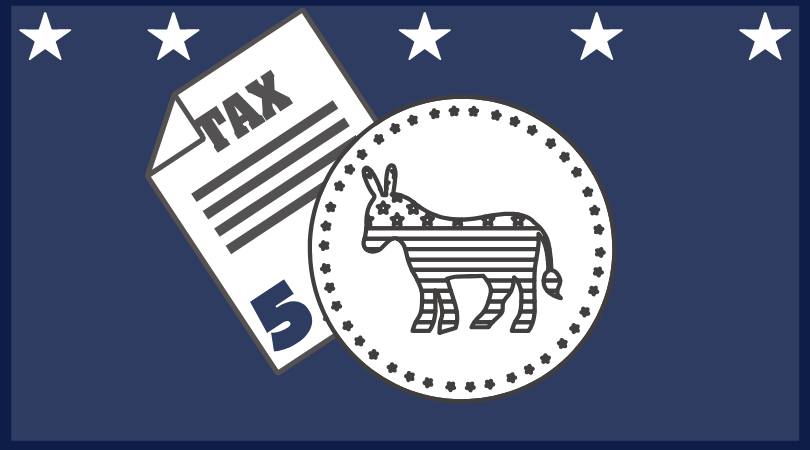After an initial review of the various 2020 Democratic presidential contenders’ tax proposals, the CPA tax committee noted a lack of progress on corporate tax reform. Committee members subsequently voted on the remaining corporate tax proposals.
By David Morse, Tax Policy Director
The Coalition for a Prosperous America (CPA) believes corporate tax reform should stop discrimination against domestic companies as they compete with large, multinational companies. And it should incentivize production and investment in the US while improving overall US trade performance. Currently, US and foreign multinationals often profit from selling in the US market while evading taxes by moving profits or production offshore.
CPA also supports a plan to address the trade suppression impact of foreign value-added taxes (VATs) that average 17 percent globally. Countering foreign VAT’s can be accomplished via a US goods and services tax (GST), with the proceeds used to offset other domestic taxes such as payroll taxes. Domestic taxpayers would pay no new net tax, foreign companies would pay the new GST, and American-made products would be exported GST-free.
The ‘Top 3’ list (below) weighs the best tax plans from the candidates in terms of improving America’s trade competitiveness. The various tax proposals were rated from A to F by CPA tax committee members using the following criteria: recognition of problems relevant to domestic businesses; effectiveness of a candidate’s tax proposal; and, a candidate’s particular emphasis on the particular plan.
NOTE: Vice President Biden and Senator Harris’s tax plans were not graded due to what was viewed as continued vagueness in the details offered.
 Pete Buttigieg’s Apportionment (Sales implied) Tax System
Pete Buttigieg’s Apportionment (Sales implied) Tax System
Mayor Pete Buttigieg expressed his perspective on multinational corporate tax avoidance on a Daily Show segment “Between The Scenes.” To combat base erosion, Buttigieg expressed support for the apportionment system currently in use by many states. He further implied that this would be something along the lines of “Sales-Factor Apportionment.” That system would tax the profits of all corporations based on the share of their worldwide sales that are destined for customers in the United States.
Despite Mayor Buttigieg’s solution being nearly perfect, his failure to promote his SFA plan raises questions about his commitment. CPA concerns include: lack of clarity, failure to mention small domestic companies being hurt, and not clearly making SFA part of his speeches or his platform.
Nonetheless, Buttigieg’s plan had the highest grade, due to his recognition of Sales Factor Apportionment as an optimal solution.
GRADE: C+
 Andrew Yang’s Value-Added Tax
Andrew Yang’s Value-Added Tax
Andrew Yang has proposed a 10 percent value-added tax to help pay for some of his major policy proposals. Value-added taxes are currently imposed by many countries and assessed at every stage of production. They provide a de facto subsidy for foreign manufacturers and a tariff on US exports. Yang has proposed a US Value Added Tax, though at only a 10% rate.
Yang’s VAT proposal fails to recognize the trade benefits of a value-added tax. CPA has concerns that his 10 percent rate is too low. For trade purposes, it would be more beneficial if Yang’s VAT were closer to the global average of 17 percent. However, Yang has made his tax proposal a top campaign priority and has spoken extensively on the subject.
Yang’s plan achieved the second-highest grade.
GRADE: C+
 Elizabeth Warren’s Real Corporate Profits Tax
Elizabeth Warren’s Real Corporate Profits Tax
Senator Elizabeth Warren released a corporate tax reform plan targeting the largest corporations in the US. She clearly recognizes the harm that multinational tax avoidance poses to domestic companies. Her solution is widely publicized and distributed. The Real Corporate Profits tax she suggests imposes an extra 7 percent surcharge on every dollar of corporate profit after the first $100 million. This surcharge tax would not be reduced by any tax loopholes.
However, Warren’s proposal still fails to address foreign corporate tax avoidance as well as accelerated offshoring. Additionally, her tax would only target American corporations. Foreign corporations of larger size would likely keep their tax advantages. This problem has yet to be addressed in her proposals.
Warren’s proposal barely passed the CPA review.
GRADE: C-
CPA’s Tax Committee also has some concerns on another tax plan:
The Carbon Tax (Numerous campaigns)
A carbon tax places a significant tax burden on fossil fuels to discourage their use. However, the tax is only implemented on imported fuels or those mined in the US, but not on products manufactured overseas via fossil fuel use.
This creates a problem: Domestic companies will be paying for higher-cost energy inputs, but foreign competitors will not. Any tax plan to discourage carbon use must deal with this advantage for carbon-intensive foreign production. Otherwise, consumers will still buy cheap carbon-intensive imported products instead of low-carbon expensive domestic products.
Read more on competitive tax policies here.
Do you agree with our rankings? Leave your comments below:













